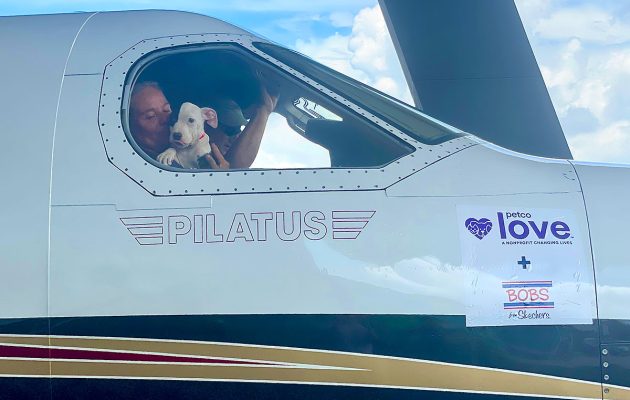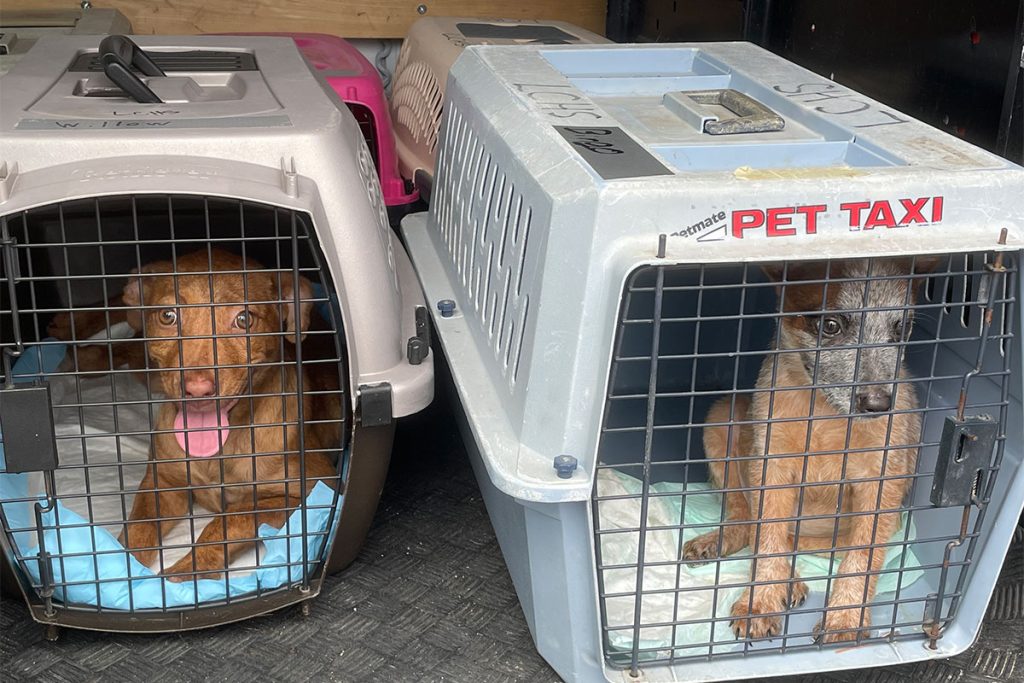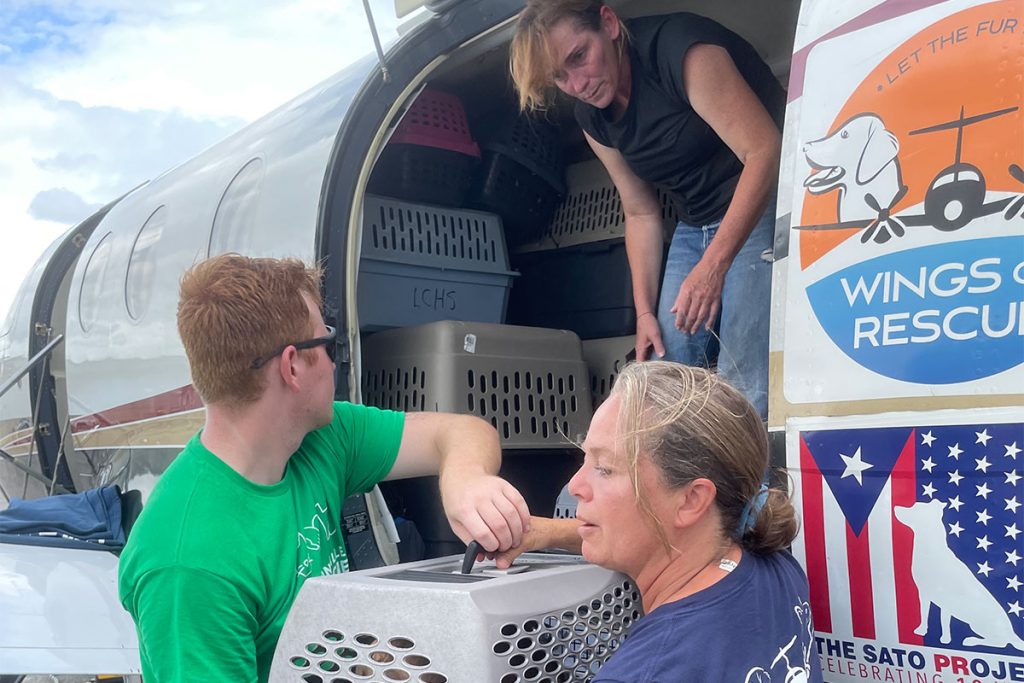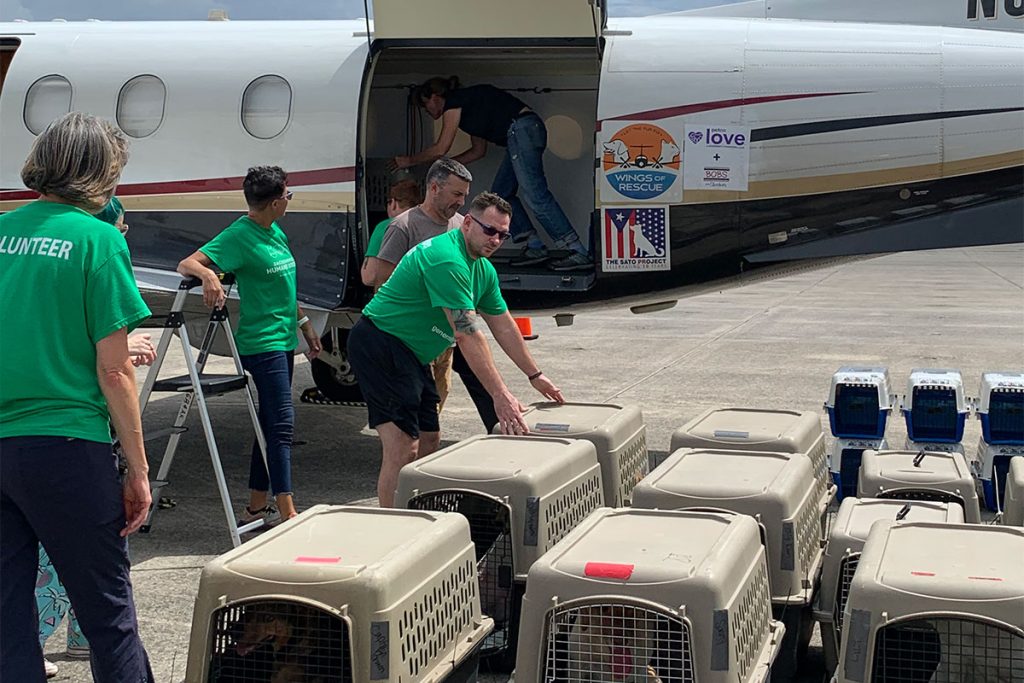Animal House: Shelter from the Storm

On Friday and Saturday, Sept. 1-2, Jacksonville supported a Hurricane Idalia Pet Flight Mission and Vehicle Transport Caravan that moved animals out of shelters in Florida to make room for pets affected by the storm. The flight was organized after Idalia, a Category 3 hurricane, made landfall Aug. 30 at Keaton Beach, Florida, in the panhandle’s Big Bend area.
Idalia’s eye tore across Taylor, Suwanee, Columbia and Baker counties, skirting Jacksonville before reaching Georgia. Its storm surge, wind and rain caused destruction and at least three confirmed deaths. In addition to the disastrous impact on residents and structures, it also brought flooding, damage and power outages to animal shelters and outdoor kennels in the hardest-hit areas.
A natural disaster pet flight mission aimed to alleviate the burden on Florida animal shelters was quickly organized. According to Denise Deisler, CEO of Jacksonville Humane Society (JHS), the flight was made possible through cooperation between national and local animal welfare organizations: Petco Love, Bobs from Skechers, Wings of Rescue Disaster Response Flights and Jacksonville Humane Society’s Florida Leaders in Lifesaving. The coalition arranged for a Wings of Rescue plane to pick up shelter pets in Tampa, coordinated by the Humane Society of Tampa Bay and the Pet Resource Center at Hillsborough County Animal Shelter. The plane then flew to Jacksonville’s Cecil Airport to pick up more shelter pets before delivering them north to waiting shelters.

There were multiple vans carrying cats and dogs waiting on the Cecil Airport tarmac. They came from the Lake City Humane Society, North Florida Animal Rescue in Wellborn, Florida, and JHS. Transferring animals to other rescue organizations opened kennel space for shelters in the storm’s path, allowing those impacted shelters to respond to community needs and provide desperately needed help for pets that went missing, became homeless or were injured by the hurricane. Doing so also allowed any storm-damaged shelters to close for repairs or await restoration of electricity and utilities. The Lake City and North Florida shelters both lost power and sustained extensive damage to their outdoor kennels.
“We are a small shelter and have been without power,” said Lake City Humane Society Shelter’s Operations Director Ashley Gerondale. “We are overwhelmed with gratitude and can’t put into words how grateful we are for this help.”
Before the flight, volunteers checked on the pets, provided water, comfort and cleaned up when necessary. Some of the dogs and cats of various ages and sizes even wiggled, wagged their tails and pushed excited noses and faces forward for attention from nearby people.
Each animal was fully vaccinated and medically cleared for travel by a licensed veterinarian. All pets traveled in an individual crate with water and were monitored by volunteers. The pets fly in pressurized, temperature-controlled cabins, breathing the same air as the pilots, according to Ric Browde, Wings of Rescue president and CEO.

Wings of Rescue volunteer pilot Kale Garcia, who has 15 years of experience, evaluated every crate’s size and weight for efficient loading onto the Swiss Pilatus PC-12 single-engine aircraft. His goal was to load every animal on board. As the crates of all sizes were unloaded and lined up on the tarmac at his direction, he coordinated placement onto the plane with Maggie McGuane, Wings of Rescue Disaster Response Coordinator.
“There were so many animals that needed transport. I decided to rent a car and drive [from Tampa] to leave extra space free for more crates,” she said.
McGuane, from Montana, travels wherever she is needed, at a moment’s notice to assist with animal disaster response and transport. Because she has family in Florida, she was well aware of the severity of the storms that hit the state.
The airlifted pets were flown to the Brandywine Valley SPCA (Society for the Prevention of Cruelty to Animals). The organization is the area’s largest animal welfare organization with multiple shelter locations in Pennsylvania and Delaware. They agreed to accept the 65 Florida cats and dogs and find them adoptive homes. No local shelter pets, however, are ever displaced by animals flown in from elsewhere.
Garcia’s wife and co-pilot, Anji, assisted with the airlift. The couple are volunteer pilots for animal welfare missions and have volunteered for Wings of Rescue since the organization formed in 2012. These passionate animal advocates have flown thousands of animals to safety, usually flying four to five trips monthly. They formed a nonprofit charity, FETCH, to raise funds for emergency animal welfare flights not covered by other organizations.

Their story started 15 years ago during a Christmas Eve storm when the Garcias saw a man unloading a pet crate out of his plane.
“I said, ‘Kale, look! He brought his dog with him,’” Anji Garcia said. “But then he unloaded another crate and put it his vehicle. Then another and another. That’s when I had to go over and ask him what was going on. He told me he found out that they were going to be euthanized the next day and he had to save them. He had contacted a local rescue that was willing to accept every one, so he rescued those dogs. We never knew this kind of mission existed, but here we were, just the two of us in our almost-empty plane. Our children had left the nest; the seats in back were empty. All we could talk about was what we might be able to do if we removed those seats!”
Both say that they are just one piece of the puzzle that makes rescue flights of homeless and at-risk pets from overcrowded shelters or disaster areas possible. It takes an entire team to coordinate the logistics on the ground with the animals, airports and organizations. The in-bound flights to the affected areas often also deliver humanitarian and veterinarian aid.
The second part of Jacksonville’s efforts to help animals and shelters affected by Idalia began at dawn the next day, Sept. 2, at JHS on Beach Boulevard.
A second transport of animals was loaded into vehicles for transfer out of Florida. Approximately 100 cats and dogs from Halifax Humane Society, Sarasota Humane Society and JHS were driven to shelters in Georgia, South Carolina and Virginia.
“Connections and cooperation means we can maximize life saving, particularly during natural disasters statewide and beyond,” Deisler said. “JHS gives thanks for our community and everyone who took pets into their homes to foster prior to the hurricane.”







